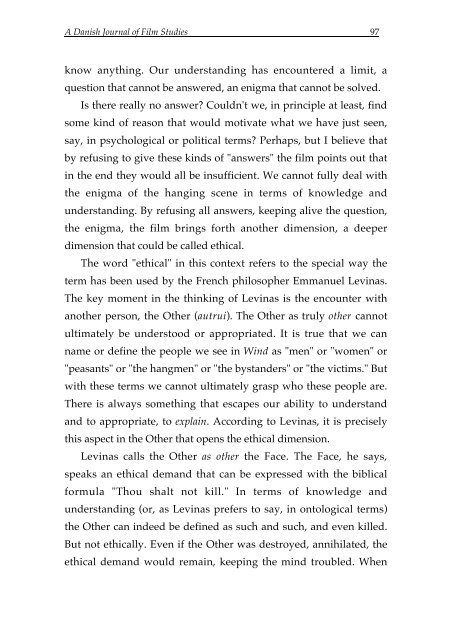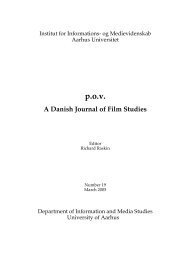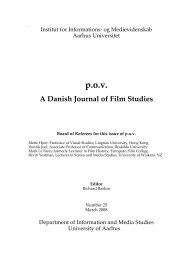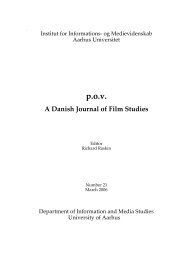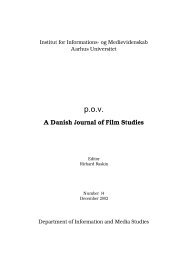The Face of Time - POV - Aarhus Universitet
The Face of Time - POV - Aarhus Universitet
The Face of Time - POV - Aarhus Universitet
You also want an ePaper? Increase the reach of your titles
YUMPU automatically turns print PDFs into web optimized ePapers that Google loves.
A Danish Journal <strong>of</strong> Film Studies 97<br />
know anything. Our understanding has encountered a limit, a<br />
question that cannot be answered, an enigma that cannot be solved.<br />
Is there really no answer? Couldn't we, in principle at least, find<br />
some kind <strong>of</strong> reason that would motivate what we have just seen,<br />
say, in psychological or political terms? Perhaps, but I believe that<br />
by refusing to give these kinds <strong>of</strong> "answers" the film points out that<br />
in the end they would all be insufficient. We cannot fully deal with<br />
the enigma <strong>of</strong> the hanging scene in terms <strong>of</strong> knowledge and<br />
understanding. By refusing all answers, keeping alive the question,<br />
the enigma, the film brings forth another dimension, a deeper<br />
dimension that could be called ethical.<br />
<strong>The</strong> word "ethical" in this context refers to the special way the<br />
term has been used by the French philosopher Emmanuel Levinas.<br />
<strong>The</strong> key moment in the thinking <strong>of</strong> Levinas is the encounter with<br />
another person, the Other (autrui). <strong>The</strong> Other as truly other cannot<br />
ultimately be understood or appropriated. It is true that we can<br />
name or define the people we see in Wind as "men" or "women" or<br />
"peasants" or "the hangmen" or "the bystanders" or "the victims." But<br />
with these terms we cannot ultimately grasp who these people are.<br />
<strong>The</strong>re is always something that escapes our ability to understand<br />
and to appropriate, to explain. According to Levinas, it is precisely<br />
this aspect in the Other that opens the ethical dimension.<br />
Levinas calls the Other as other the <strong>Face</strong>. <strong>The</strong> <strong>Face</strong>, he says,<br />
speaks an ethical demand that can be expressed with the biblical<br />
formula "Thou shalt not kill." In terms <strong>of</strong> knowledge and<br />
understanding (or, as Levinas prefers to say, in ontological terms)<br />
the Other can indeed be defined as such and such, and even killed.<br />
But not ethically. Even if the Other was destroyed, annihilated, the<br />
ethical demand would remain, keeping the mind troubled. When


